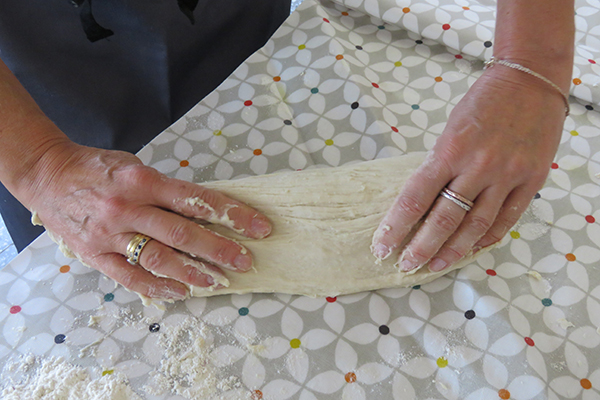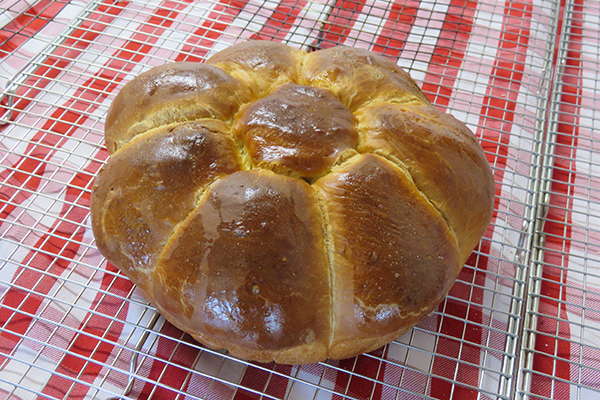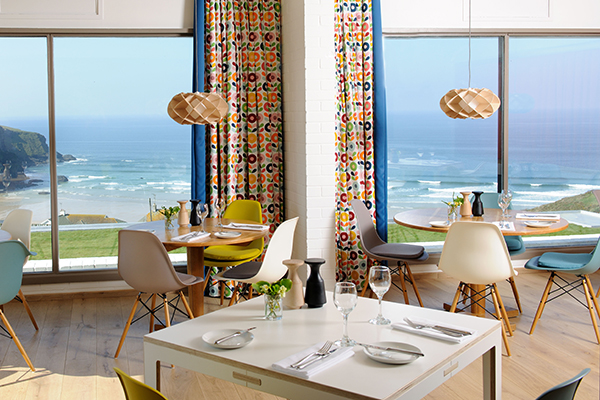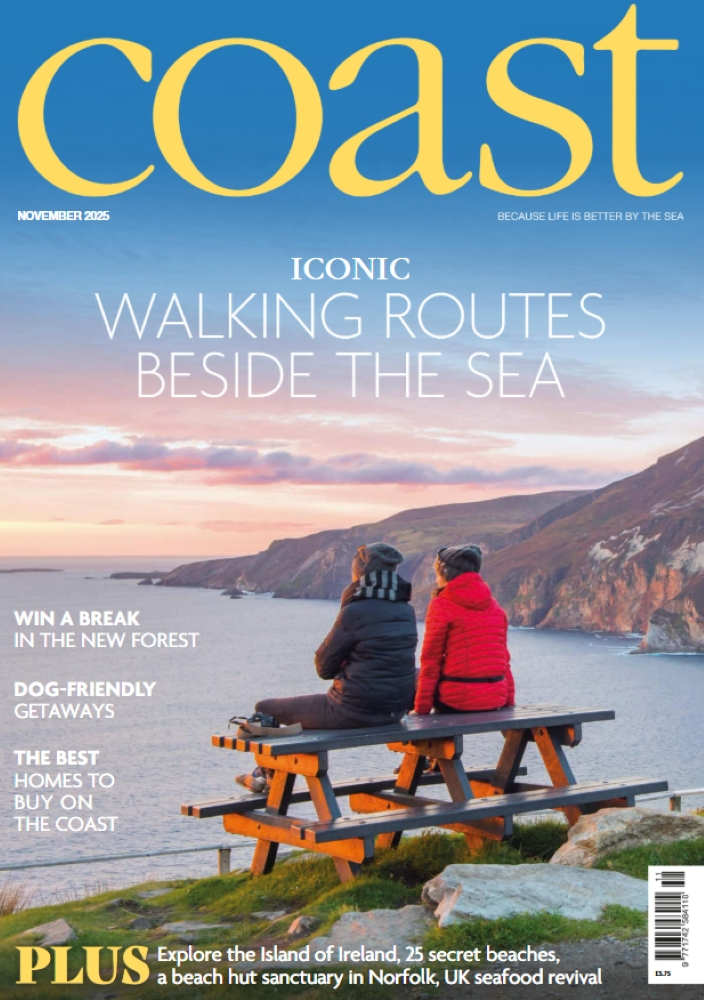Caroline Wheater learns how to make artisan-style bread in a dreamy location on the North Cornwall coast
Bread – it’s a larder basic and in recent years has reached tasty new heights thanks to the many artisan bakeries that have opened up all across the country. Ironically, the delicious breads created by these baking divas and divos are so good that you might feel less than confident about having a go yourself – will it taste as nice, will it look as tempting, and will your nearest and dearest want to eat it? A bread-making workshop is the perfect opportunity to try out your skills as you don an apron, roll up your sleeves and rediscover the joy of measuring, mixing, kneading, shaping and baking from scratch.
And what better place to skill up than at Bedruthan Hotel, with its spa for relaxing in afterwards, plus bar, café and restaurant overlooking the bay at Mawgan Porth? The hotel runs a variety of Making Breaks, with workshops on bread-making, jewellery, photography and more, encouraging guests to learn something new while relaxing in an ocean location. Highly experienced chef Adam Clark runs the bread-making courses and also bakes many of the breads served daily at Bedruthan’s Wild Café and Herring Restaurant. In Adam’s competent hands, even novices can make delicious things.

10.30AM CREATIVITY CALLING
After a morning walk down to Mawgan Porth beach, I zip up the hill to the hotel to join six other guests on the workshop, which is held in a garden suite. I’m slightly apprehensive. I can’t remember the last time I made proper bread, although a memory of baking soda bread at school floats across my mind. Sensing our trepidation, Adam gives us a pep talk. ‘I’m not going to be cracking the whip, but if there’s anything you want to do let’s go for it – I’d like you to feel creative,’ he says, and is met with bashful smiles.
10.40AM GETTING READY
We go to our prep stations – we’ve each got an apron, some linen tea towels, several bowls and baking trays, a jug, a kneading board and a pack of 10 recipes. I flick through them to find ‘Many Things’ bread dough, wholemeal soda bread, sourdough, as well as crumpets, bagels, cornbread, focaccia, naan and brioche. I’m pleased and surprised that Adam is being so adventurous with us.

10.50AM ALL PURPOSE RECIPE
Adam begins the workshop with the ‘Many Things’ recipe. ‘And it can be made into so many things,’ he says, grinning. ‘Pitta bread, bread sticks, rolls, pizza dough, little loaves.’ Aprons on, we take it in turns at the ingredients table to measure out strong white flour, plain flour, dried or fresh yeast and salt. I fill my plastic jug with 325ml of water, but Adam pulls me up. ‘It’s better to measure liquids on the scales to be precise,’ he advises.
11AM FEELING KNEADY
Ingredients gathered, I mix up a rough dough in the bowl, and then place it on a lightly oiled board to knead, pressing and thumping meditatively. ‘It should be nice and shiny, light and fluffy. Stretch the dough to work the gluten – the kneading action should be a push and a pull with the heel of your hands,’ instructs Adam, watching us like a hawk while simultaneously making a large brioche for us to try later. Thoroughly kneaded, I label my dough ball and put it in the warming room to prove.
11.30AM BACK TO SCHOOL
After a drink of water – making bread is thirsty work – we’re onto the next recipe, wholemeal soda bread. Within 20 minutes the dough, which includes black treacle and buttermilk, is ready to put into the oven at 200˚C for 40 minutes to an hour, no proving required. After shaping my round loaf, I cut a cross in it so that it can be broken into quarters once cooked.

12PM TURNING ITALIAN
We’ve got 50 minutes before lunch and it’s time to go off-piste. I plump for making focaccia, while my classmates choose bagels, crumpets and American-style corn bread. I pick fresh yeast this time, interested in how it behaves. ‘You’ll need double the amount of fresh yeast to dried,’ says Adam over my shoulder, and I weigh out 10g on the scales. The rest of the ingredients are strong white flour, salt, water, olive oil and sheer elbow grease. ‘If you don’t work the gluten enough, you don’t get the rise,’ warns Adam, as he pops over to check progress. Ten minutes later and my dough is deemed too ‘heavy’, ‘dry’ and ‘crumbly’. I didn’t add all the water because the dough seemed too floppy at first. Mistake. Adam whips it off to his station to give it the final knead it needs before proving.
12.45PM FIRST BAKED LOAF
Just before lunch in the hotel’s Wild Café, we get our soda breads out of the ovens. They look great, and Adam lifts one to examine its bottom. ‘If there’s a hollow sound when you tap the bottom of the bread, it’s ready,’ he says, as we gather around, admiring our handiwork. Then off we troop for a deli-style lunch of salads and quiche, apple juice and tea.
2.10PM A LOAF AND SOME ROLLS
Refreshed, we’re back at our stations for more floury fun. Our ‘Many Things’ dough has proved and is ready to be formed into a loaf. I decide to make some little rolls with part of mine and add in chopped spring onions and chilli, and grated Cheddar (so moreish). ‘Now, slash them, glaze with egg wash and sprinkle some poppy, nigella and sunflower seeds over them before they cook,’ says Adam, adding that steam helps make a nice crust, best achieved at home with a tray of water placed in the bottom of the oven.
3PM GOOD TO GO
My focaccia dough has proved and is ready to be arranged in a baking tray. It’s all stretchy and soft as I push it into the corners. ‘To make the dimples really push the dough down, but without knocking all the air out of it.’ As a finishing touch, I sprinkle over sea salt, rosemary and thyme leaves before putting it into the oven for 20 minutes.

4PM IMPRESSIVE RESULT
My focaccia is cooked and comes out golden brown and firm to the touch. I drizzle over some of Adam’s garlic oil. Yum. In the remaining time, I watch others make bagels and crumpets – a fascinating process. Finally, surrounded by kilos of loaves and baked goodies, we gather around Adam as the workshop comes to a close. ‘Look what you’ve done today – thanks for being up to the challenge,’ he says, and is met by a host of happy smiles.
ASK THE PRO
Pastry chef Adam Clark has been making bread and pastries for over 20 years, working for Marco Pierre White in 1990s London before relocating to foodie Cornwall where he worked as executive chef at Bedruthan. After a sabbatical, he’s back making its delicious range of daily breads, from sourdough to focaccia, and running the popular bread-making courses. Like all good chefs he has lots of energy and a passion for food and, most importantly, likes to share his knowledge. ‘Making bread is not that difficult, you just follow a recipe,’ he says modestly. ‘Homemade breads won’t last as long as shop-bought ones, but I make one and freeze one to save time. I love adding foraged ingredients too, such as herbs and wild fennel seeds, to boost the flavour. Making bread gives people the feel-good factor.’
NEED TO KNOW
BOOKING A WORKSHOP
Two-night Making Breaks at The Bedruthan Hotel in Mawgan Porth include a complimentary upgrade to a sea-view room, your choice of workshop, breakfast and dinner on both mornings and evenings, an afternoon picnic for two and a glass of fizz each, use of indoor spa facilities and a lazy 1pm checkout. Prices start from £594 per room, based on two sharing, with an additional cost of £85pp for the one-day baking workshop (which includes a two-course lunch). Call 01637 861200 or go to bedruthan.com.
GETTING THERE
By car: Mawgan Porth is close to Newquay and reached via the A303 and A30, then the B3274 and the B3276.
By rail: Catch the Great Western Railway service from London Paddington to Penzance. Change at Par for a further 50-minute rail journey to Newquay and from there via taxi to the hotel.
By air: Flybe operates flights from London Heathrow to Newquay several times a day, flight time around 50 minutes. From there, it’s a 10-minute taxi ride to The Bedruthan Hotel.
Caroline Wheater learns how to make artisan-style bread in a dreamy location on the North Cornwall coast
Bread – it’s a larder basic and in recent years has reached tasty new heights thanks to the many artisan bakeries that have opened up all across the country. Ironically, the delicious breads created by these baking divas and divos are so good that you might feel less than confident about having a go yourself – will it taste as nice, will it look as tempting, and will your nearest and dearest want to eat it? A bread-making workshop is the perfect opportunity to try out your skills as you don an apron, roll up your sleeves and rediscover the joy of measuring, mixing, kneading, shaping and baking from scratch.
And what better place to skill up than at Bedruthan Hotel, with its spa for relaxing in afterwards, plus bar, café and restaurant overlooking the bay at Mawgan Porth? The hotel runs a variety of Making Breaks, with workshops on bread-making, jewellery, photography and more, encouraging guests to learn something new while relaxing in an ocean location. Highly experienced chef Adam Clark runs the bread-making courses and also bakes many of the breads served daily at Bedruthan’s Wild Café and Herring Restaurant. In Adam’s competent hands, even novices can make delicious things.

10.30AM CREATIVITY CALLING
After a morning walk down to Mawgan Porth beach, I zip up the hill to the hotel to join six other guests on the workshop, which is held in a garden suite. I’m slightly apprehensive. I can’t remember the last time I made proper bread, although a memory of baking soda bread at school floats across my mind. Sensing our trepidation, Adam gives us a pep talk. ‘I’m not going to be cracking the whip, but if there’s anything you want to do let’s go for it – I’d like you to feel creative,’ he says, and is met with bashful smiles.
10.40AM GETTING READY
We go to our prep stations – we’ve each got an apron, some linen tea towels, several bowls and baking trays, a jug, a kneading board and a pack of 10 recipes. I flick through them to find ‘Many Things’ bread dough, wholemeal soda bread, sourdough, as well as crumpets, bagels, cornbread, focaccia, naan and brioche. I’m pleased and surprised that Adam is being so adventurous with us.

10.50AM ALL PURPOSE RECIPE
Adam begins the workshop with the ‘Many Things’ recipe. ‘And it can be made into so many things,’ he says, grinning. ‘Pitta bread, bread sticks, rolls, pizza dough, little loaves.’ Aprons on, we take it in turns at the ingredients table to measure out strong white flour, plain flour, dried or fresh yeast and salt. I fill my plastic jug with 325ml of water, but Adam pulls me up. ‘It’s better to measure liquids on the scales to be precise,’ he advises.
11AM FEELING KNEADY
Ingredients gathered, I mix up a rough dough in the bowl, and then place it on a lightly oiled board to knead, pressing and thumping meditatively. ‘It should be nice and shiny, light and fluffy. Stretch the dough to work the gluten – the kneading action should be a push and a pull with the heel of your hands,’ instructs Adam, watching us like a hawk while simultaneously making a large brioche for us to try later. Thoroughly kneaded, I label my dough ball and put it in the warming room to prove.
11.30AM BACK TO SCHOOL
After a drink of water – making bread is thirsty work – we’re onto the next recipe, wholemeal soda bread. Within 20 minutes the dough, which includes black treacle and buttermilk, is ready to put into the oven at 200˚C for 40 minutes to an hour, no proving required. After shaping my round loaf, I cut a cross in it so that it can be broken into quarters once cooked.

12PM TURNING ITALIAN
We’ve got 50 minutes before lunch and it’s time to go off-piste. I plump for making focaccia, while my classmates choose bagels, crumpets and American-style corn bread. I pick fresh yeast this time, interested in how it behaves. ‘You’ll need double the amount of fresh yeast to dried,’ says Adam over my shoulder, and I weigh out 10g on the scales. The rest of the ingredients are strong white flour, salt, water, olive oil and sheer elbow grease. ‘If you don’t work the gluten enough, you don’t get the rise,’ warns Adam, as he pops over to check progress. Ten minutes later and my dough is deemed too ‘heavy’, ‘dry’ and ‘crumbly’. I didn’t add all the water because the dough seemed too floppy at first. Mistake. Adam whips it off to his station to give it the final knead it needs before proving.
12.45PM FIRST BAKED LOAF
Just before lunch in the hotel’s Wild Café, we get our soda breads out of the ovens. They look great, and Adam lifts one to examine its bottom. ‘If there’s a hollow sound when you tap the bottom of the bread, it’s ready,’ he says, as we gather around, admiring our handiwork. Then off we troop for a deli-style lunch of salads and quiche, apple juice and tea.
2.10PM A LOAF AND SOME ROLLS
Refreshed, we’re back at our stations for more floury fun. Our ‘Many Things’ dough has proved and is ready to be formed into a loaf. I decide to make some little rolls with part of mine and add in chopped spring onions and chilli, and grated Cheddar (so moreish). ‘Now, slash them, glaze with egg wash and sprinkle some poppy, nigella and sunflower seeds over them before they cook,’ says Adam, adding that steam helps make a nice crust, best achieved at home with a tray of water placed in the bottom of the oven.
3PM GOOD TO GO
My focaccia dough has proved and is ready to be arranged in a baking tray. It’s all stretchy and soft as I push it into the corners. ‘To make the dimples really push the dough down, but without knocking all the air out of it.’ As a finishing touch, I sprinkle over sea salt, rosemary and thyme leaves before putting it into the oven for 20 minutes.

4PM IMPRESSIVE RESULT
My focaccia is cooked and comes out golden brown and firm to the touch. I drizzle over some of Adam’s garlic oil. Yum. In the remaining time, I watch others make bagels and crumpets – a fascinating process. Finally, surrounded by kilos of loaves and baked goodies, we gather around Adam as the workshop comes to a close. ‘Look what you’ve done today – thanks for being up to the challenge,’ he says, and is met by a host of happy smiles.
ASK THE PRO
Pastry chef Adam Clark has been making bread and pastries for over 20 years, working for Marco Pierre White in 1990s London before relocating to foodie Cornwall where he worked as executive chef at Bedruthan. After a sabbatical, he’s back making its delicious range of daily breads, from sourdough to focaccia, and running the popular bread-making courses. Like all good chefs he has lots of energy and a passion for food and, most importantly, likes to share his knowledge. ‘Making bread is not that difficult, you just follow a recipe,’ he says modestly. ‘Homemade breads won’t last as long as shop-bought ones, but I make one and freeze one to save time. I love adding foraged ingredients too, such as herbs and wild fennel seeds, to boost the flavour. Making bread gives people the feel-good factor.’
NEED TO KNOW
BOOKING A WORKSHOP
Two-night Making Breaks at The Bedruthan Hotel in Mawgan Porth include a complimentary upgrade to a sea-view room, your choice of workshop, breakfast and dinner on both mornings and evenings, an afternoon picnic for two and a glass of fizz each, use of indoor spa facilities and a lazy 1pm checkout. Prices start from £594 per room, based on two sharing, with an additional cost of £85pp for the one-day baking workshop (which includes a two-course lunch). Call 01637 861200 or go to bedruthan.com.
GETTING THERE
By car: Mawgan Porth is close to Newquay and reached via the A303 and A30, then the B3274 and the B3276.
By rail: Catch the Great Western Railway service from London Paddington to Penzance. Change at Par for a further 50-minute rail journey to Newquay and from there via taxi to the hotel.
By air: Flybe operates flights from London Heathrow to Newquay several times a day, flight time around 50 minutes. From there, it’s a 10-minute taxi ride to The Bedruthan Hotel.



















